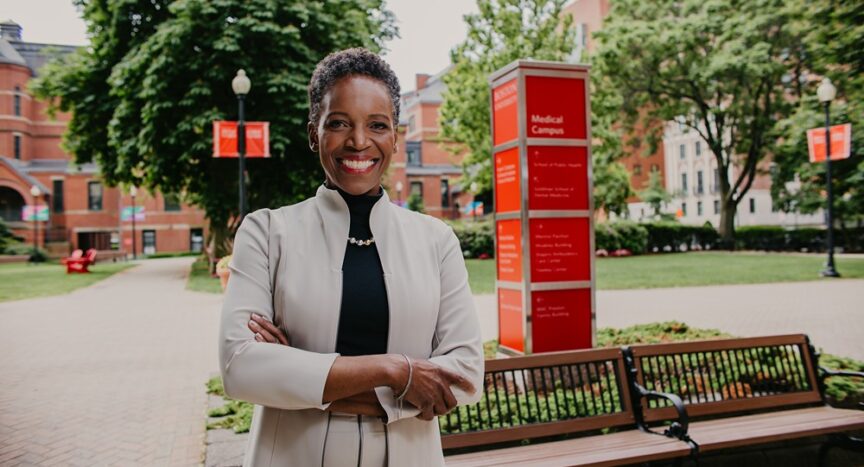The new and 11th president of Boston University (BU), Dr. Melissa L. Gilliam, was drawn to the school due to its exceptional sciences and humanities programs. “It has a proud history [in those], along with great undergraduate, professional and graduate schools, including an excellent medical school, which is especially attractive to me as a physician,” Gilliam told EBONY. “It also has a wonderful history of being open and accessible to all people from its beginning.”
Dr. Gilliam previously worked at The Ohio State University, where she held the Engie-Axium chair and served as executive vice president and provost overseeing 15 colleges and six campuses and the Office of Academic Affairs, including undergraduate education, graduate education, international affairs, diversity and inclusion, external engagement, online learning and information technology.
Taking office July 1 and with only a few months under her belt at BU, Dr. Gilliam is powering forward with her unifying vision for the large institution. “Now is an interesting and challenging time in higher education. Over the past year especially, people on campuses across the world have experienced profound pain and sadness related to personal loss and global conflict. One of my first initiatives at BU recognizes this reality, and it strives to further enable our university to identify, and then practice, the core principles and beliefs that unite us,” she revealed.
“I’m calling this the Living Our Values project, and I’m hopeful that the BU community’s shared values will, in turn, guide our decisions, behaviors and actions in ways that foster inclusivity, integrity and positive impact.”
Her sentiments resonate well with Boston University’s strong traditions in free speech and civil discourse. Martin Luther King Jr. earned his Bachelor’s degree in Sociology from the institution in 1948 and also received his doctorate degree.
“I believe that we can build on these strengths in creating an environment where all of us feel welcome, where open dialogue is the norm, and where, as our mission statement says, we prepare our students to be ‘resourceful individuals ready to live, adapt and lead in an interconnected world.’”
Dr. Gilliam is drawing on her life experiences to achieve this goal. For educators new and seasoned, she encourages “every leader to draw upon their personal experiences to build empathy and strength.”
Knowing that there will be leaders like herself who will one day follow in her footsteps, Dr. Gilliam shared this advice, “The most important thing is to have a successful academic career (e.g., scholar, educator, researcher, professor). You have to work your way up the career ladder. As you do so, you must also gain the skills, habits of mind and behaviors to deal with higher education.”
She stressed that taking the lead in your personal development is paramount. “Studies show that when young people initiate and build their networks, the relationships they form are more likely to bear fruit and become lasting ones.”
Her final nugget of advice is to surround yourself with mentors and others who can offer advice and answer questions along the way.
“Don’t be afraid to ask caring adults in the communities in which you live, study and work with whom you share interests for their mentorship. Then, prepare to reach out before you have a challenge,” she declared. “Plan for some of these relationships not to work out. Don’t get discouraged. And say yes to the opportunities that you are offered.”



